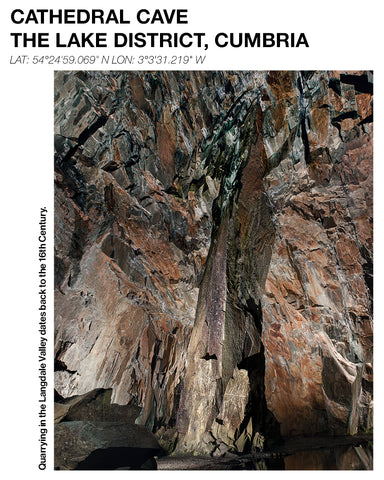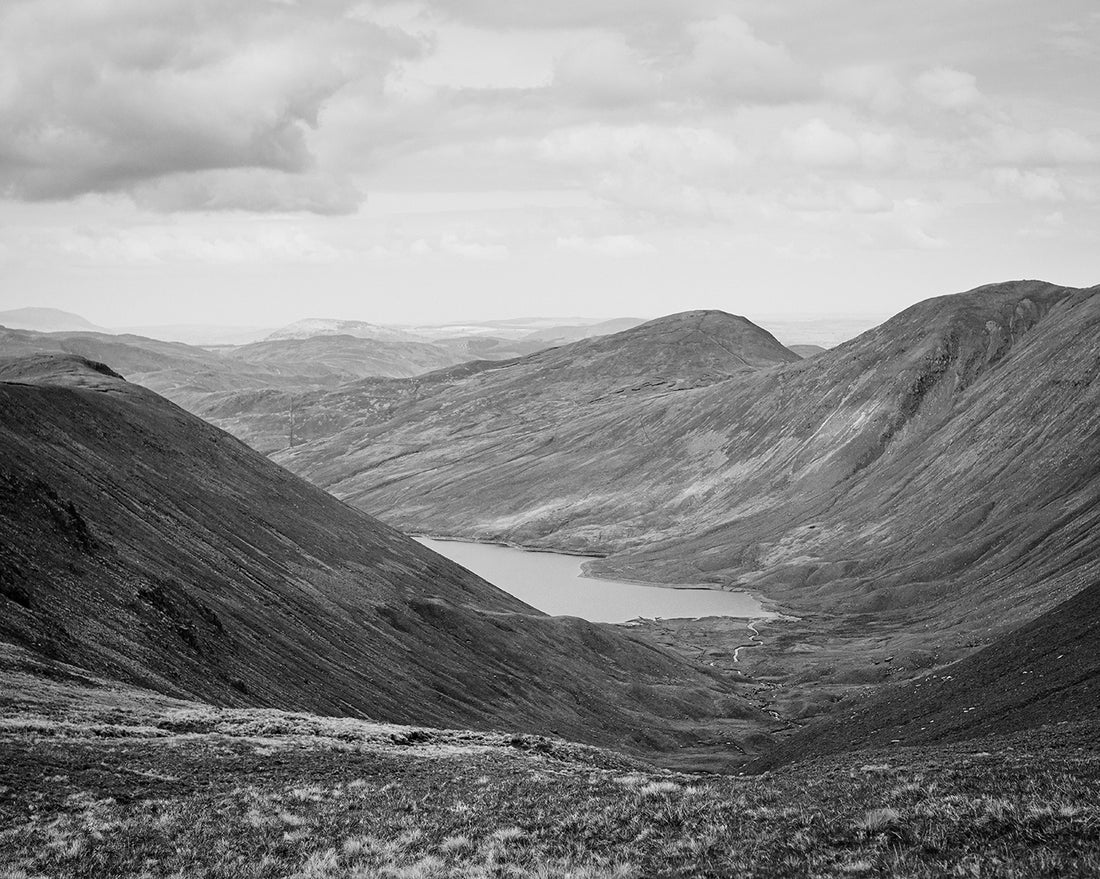
- How has the Lake District influenced your photography style?
The Lakes has been an enormous shift in my photography style and I’m still getting to grips with it, but my interest has always really come from portraying the working-class experience in the UK, which lately has led me to working more in ex-mining areas, where the history of working-class struggle is visible in, and underneath, the landscape. I’ve developed techniques on the way to finding my vision which I’d rarely practised before, so it’s also been a great learning experience. I’m definitely working in more landscape-based areas now, which I’m finding new strengths in.
- As a manager of an art gallery, how do you balance your time between organising the gallery (curating)and pursuing your own photography?
I find that my ideas of what I want to achieve in my photography are what’s truly driving me, as I often put a lot of planning, research and testing into my work so of course, I have to use my time wisely in that respect and am striving to flesh out a vision meaningfully. I also find the gallery work very well balanced, because I have my own responsibilities there and I’m very proud of the work that I do, with the support I need from the company to also work commercially and personally on photography and film when I need to. Additionally, the artworks are always changing and I give myself time to reflect on all their inspiration and creation and see where my work might fit in as part of the wider Lake District Art movement.
- What are some unique challenges and opportunities you face as a photographer based in the Lake District?
There are many of both! In terms of challenges, the first would be physical. It’s not just a technical exercise making photographs here, it involves strenuous walking, climbing, carrying and looking after equipment in wild conditions, the list goes on. It’s made me the most physically fit I’ve probably ever been. Secondly, the challenge of carving out my own path in terms of what I want to make, and the work I want to be known for.
In terms of opportunities, it’s interesting, too. The ‘saturation’ I spoke about, makes it difficult to get your work seen and sold in the area, but when the opportunity comes, every gallery in the LDNP has a huge footfall so your work is seen by hundreds of people.
Occasionally there are grants and exhibitions to work towards too which again bring great numbers of visitors.

Yes, but it could be a long list!
- Helvellyn, because the views evolve so much, the light changes so quickly and the 360 degree view from the summit is one of the most awesome things in the country.
- Bowfell and The Band, as the walk shields the view of Scafell Pike for some time, then you are eventually presented with those gigantic rocks right in front of you and the vast chasm of Upper Eskdale beneath, it’s what the word ‘sublime’ was invented for.
- Cathedral Cave, Little Langdale - I’ve visited this place many times and it never feels the same twice. The inspiration for me comes from the centuries of history that culminate at this enormous site as well as the structural makeup of the remaining cavern and its tunnel networks. I’m currently exploring how I can shoot some of the deeper slate mines in the area in a similar way to how I have done Cathedral.
- Watermillock, Ullswater - In summer, the way the sun sets over the west end of the lake is incredible and there’s a peace like you don’t find in the busier areas. The elevated view over the lake from here is truly special.
- Kentmere Valley - another quiet area of the lakes that retains a lot of its historic rawness left over from the busy days of mining. Places that hold a lot of history I tend to find more interesting and inspiring those that are typically picturesque.
- Catbells Terrace, Derwentwater - where I made some of the first images I was really proud of and decided to print as it’s an enormous view within which many different amazing views exist.

I would advise anyone hoping to work with a gallery:
- Not to rush; to spend time perfecting your output as there are myriad decisions that go into the final outcome of products. Ensure the product you’re offering is truly an authentic piece of you that you’re proud to show off and your confidence in doing so will follow, as will interest and sales.
- Spend a lot of time with printing. It can make or break your photography that you’ve already put so much time into shooting and editing.
- Get to know your local framer! Book an appointment with them, take test prints and see what options they have that can help you achieve your ambition with framing.
- When you’ve decided how you want to do your printing and framing, order more than you need (as bulk buying tends to lead to discount) because if your work starts to sell, you’ll need to replace the stock quickly as galleries don’t want empty spaces!
- Look around and find galleries you like, and ones you don’t like, and figure out where you’d like your work to be seen. Decide if what you have to offer looks like it will fit in their catalogue; as it may be the case that it is geared towards a clientele that may or may not appreciate the style of your work. If there’s already someone out there doing what you’re doing, go back to the drawing board and see how you can do it better! I find that it’s important to take inspiration not only from what you like, but what you don’t like, too.

How do you incorporate storytelling into your photography, particularly when capturing the landscapes and culture of the Lake District?
I think that my work nowadays is less project-based, and more working towards a larger body of work in which I’m trying to tell the less-told story of the area. I try to weave metaphor into each of my images so that they’re not purely face-value and straight documentary. I also am not scared to use photoshop to accentuate parts of an image which might add a sense of the surreal to them, (which I’ve always been interested in photographically) and helps me in finding my photographic identity. I would say that there is an overarching theme of melancholy throughout my work, which points towards self-discovery and a general displeasure at the world we live in which butts heads with this ridiculously beautiful landscape I’m lucky enough to live in. I conduct a lot of my practice alone which I think is something I communicate quite well through the photographs I make.
Are there any specific themes or subjects that you find yourself drawn in your photography?
As I mentioned before, the theme of the British Working Class experience is something that I try and work closely with, and has been a running theme with my work for around 10 years in various places I’ve lived. This theme pervades into my commercial work too, as I hope to work alongside more small businesses with sustainable business ethos behind them. I try and focus my work so that it has some political meaning, as otherwise I find it decorative and falls short of what I want from it.
I also find that climate change is something that underpins my work and is currently inspiring a different project I want to commence working on. There’s definitely a feeling of fragility in a lot of my landscape photography and I try not to make too many ‘postcard’ pictures, that lose their meaning in the sea of imagery.
And since I graduated from the Documentary course at Newport, I’m always thinking about industry - past and present. The course was situated a stone’s throw from the Welsh coal mining valleys in which the communities had more than their share of poverty and of course, disaster - so I’m often thinking about how our modern industrial life (that includes tourism), affects our working people. Cumbria has its own mining disaster stories, did you know?
What role do you believe photography plays in preserving and promoting the natural and artistic heritage of the Lake District?
I think art as a whole, not just photography, has a vital role to play in the communication of important issues. As a culture we’re moving towards more image-based communication and although education on the language of imagery is still catching up, we can profoundly communicate through art, photography and film what’s prescient in terms of the problems we face. As makers we have a responsibility to preserve and protect the things that give us inspiration, so that others might be able to be inspired and learn from them too. The Lakes is a place with centuries of artistic history, and centuries of future still to be realised and all artists and makers will find their place within those histories also. For me, I believe there are many stories that have yet to truly see the light of day which have been born in this area and this has led to the conception of a project I’m hoping to begin soon.
How do you stay inspired and continue to evolve as a photographer while managing the responsibilities of an art gallery?
I think working in the art environment (our gallery is always very busy) allows me to understand the varied interests and appreciations that people have in terms of how they see the Lakes. I take this feedback on board and put it into my work, as going back to ‘finding my vision’, I feel it’s pertinent to stay focussed on achieving my own ideas, without bending or diluting the work under the pressure of commercial success. Being here has taught me how to use my camera, tools and programs in ways I’d not really tried before, so even in that there is progress and inspiration. I really enjoy my responsibilities at the gallery and find that the company appreciate my efforts and values, and I feel valued as a colleague, so this job satisfaction coupled with the interaction I get from visitors really gives me the clear head I need when thinking about my next photograph.


